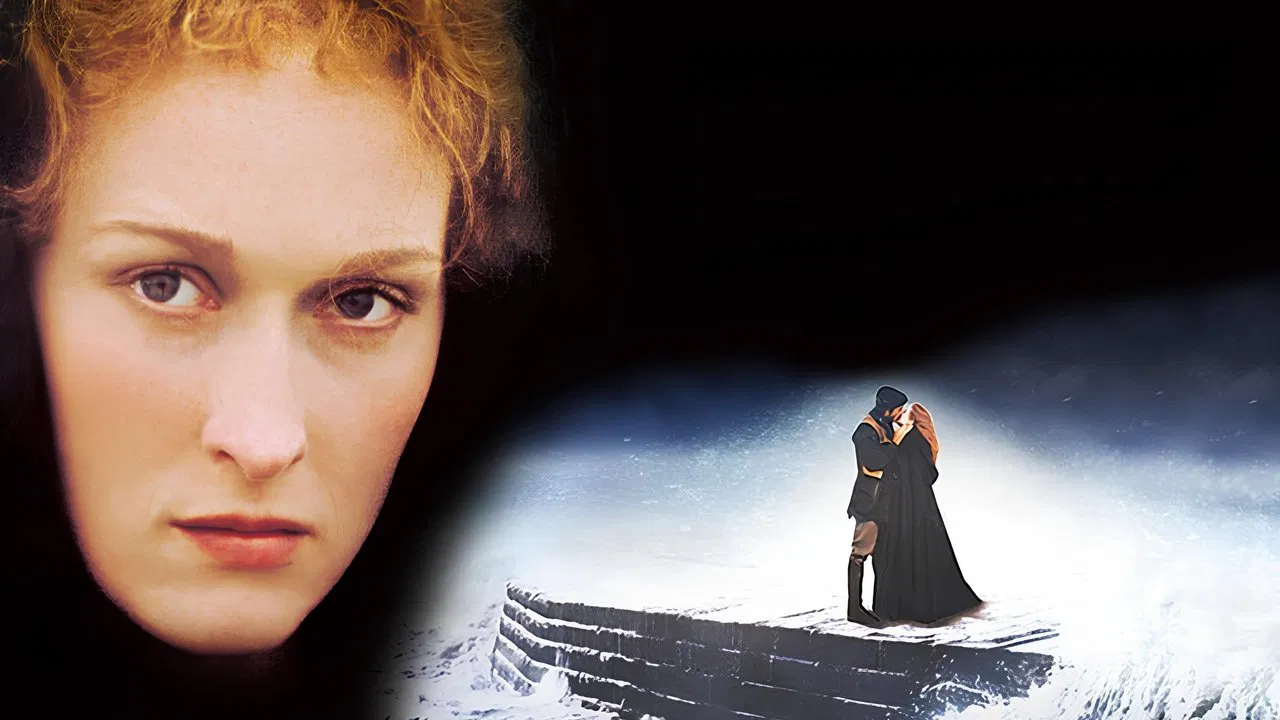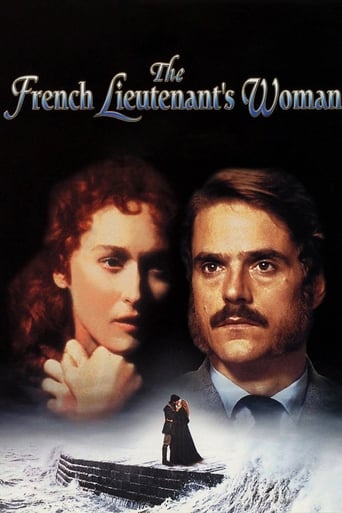

it is a beautiful film. for the story and for the grace of adaptation. for the graceful performances of Meryl Streep and James Irons. for the spirit of novel who has the right frame. for atmosphere. and for something else, who escapes to any definition. a film about love and the art of acting. a drama. or just a poem. like the novel. an impressive success of entire team to give the perfect adaptation to a not real comfortable novel for a director. the flavor, the states, the beauty of details, the stories like an impressive ladder. and the bitter air of a search of happiness. it is not easy to define it. only to see. maybe, twice. and, after the final credits, to look for the book. and this is all.
... View MoreI saw this movie in the early Eighties, and loved it. I was struck by the beauty of Meryl Streep. I read the book a few years later, and from what I remember, Sarah Woodruff whipsawed Charles Smithson at least one more full cycle of falling for her and being abandoned by her. The framing device of the movie being made is OK. It annoyed me back in the day, but I can see its effectiveness now. It is a way to make commentary on the Victorian times (and their hypocrisy), plus I suppose that it substitutes for that additional cycle of hurt. Great settings and photography of 1860's England. Excellent acting all around, and a good script, once you get past the modern-day scenes. Highly recommended.
... View More*Spoiler/plot- The French Lieutenant's Woman, 1981. As Mike and Anna, two film actors involved in a tumultuous affair, and Charles and Sarah the star crossed Victorian couple whom the actors portray. Charles reputation is ruined by the enigmatic Sarah, Mike finds he cannot accept the affections of the wily temperamental Anna. The weaving of these two love stories---One Victorian and one contemporary give an insight into human passion and emotion.*Special Stars- Meryl Streep, Jeremy Irons, David Warner, Leo McKern.*Theme- Love is fickle.*Trivia/location/goofs- Filmed entirely in England. Oscar winner for Best Actress, Meryl Streep. This film is not very true to the intricacies of the book plot. Vanessa Redgrave was supposed to play the Sarah role, but a satisfactory script was never achieved.*Emotion- A script that is decidedly a 'chick flick' with all of the drama and emotions of two small people in their respective lives. The jump editing between present day and Victorian times is jarring and adds confusion. There is little on screen 'heat' between the male and female lead actors, bad casting. While the cinematography and locations was visually inspiring, the plot was uninteresting and slow with little pacing to keep the viewer engaged. Not for the viewer that is looking for some adventure, drama or human insights into interpersonal relationships.
... View MoreThis film is a joy to watch -- as not many films these days are. The settings are superbly created -- the green, grotto-like woodland where Irons and Streep meet in the Victorian world of the film, the murky streets of Lyme, Exeter, and London, and the interior of the lawyer's office, for example. The Victorian part of the film emerges from the dawning of the concept of abnormal psychology (just before Freud) and is really convincing. Streep shows us that her character cannot move on emotionally until she has worked out her own madness. That constitutes a remarkable and complex performance of insanity and self-awareness inhabiting a single psyche. She earns the gentle movement out of the tunnel and onto the calm lake. The turbulence of the unconscious -- that threatening sea of which Irons has warned her -- has been subdued. Seems to me the flaw lies in the 'modern story' (as some here have pointed out). It may be that the Streep character is trying to find a subtext for her fictional heroine, but it looks like the old ennui, so that, while her lack of concern for the relationship is understandable, his obsession with it is not. Though the garden party at the end almost gets it there. Were we shown her decision there? If so, I missed it. I like the concept of the 'two endings' and their contrast, but the ending in the 20th century was a so what? The one in the 19th century was complex and included much of the pain that the relationship had caused both characters. A little more attention to the contemporary love affair -- to suggest that it was more than just a romp on location -- would have helped that dimension of the film per se and also suggested what the Victorian lovers had earned within their Hardyesque world.
... View More